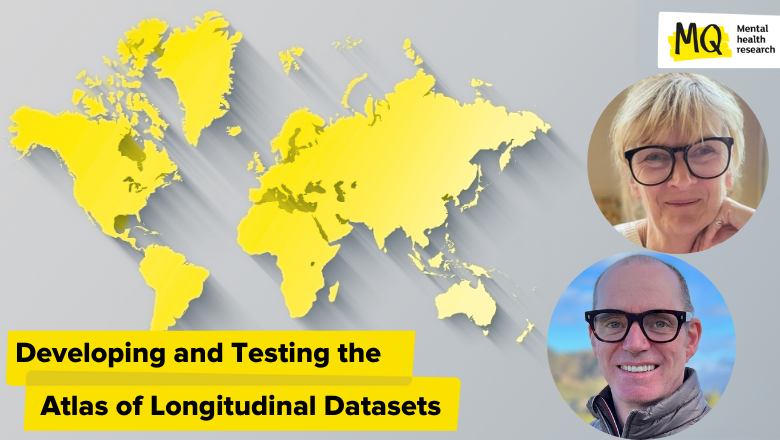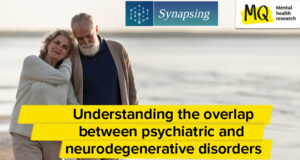
Researchers at King’s College London, supported by MQ, the Wellcome Trust and experts by lived experience have launched a ground-breaking platform that can facilitate research into health and wellbeing. In this blog, lived experience experts, Jan Speechley and Michael McTernan, explain more about this revolutionary approach.
As Lived Experience Experts (LEEs) based in England and Scotland, we are often asked to contribute to lots of different projects. When we say ‘yes’, we embark on a journey of discovery that is often surprising and always educational.
Being asked to take part in the development of the Atlas of Longitudinal Datasets has been an especially rewarding and interesting experience. This is a collaboration between King’s College London (KCL), MQ Mental Health Research, DATAMIND and The Welcome Trust and aims to create an atlas with information about longitudinal datasets from across the world and make them easily discoverable and accessible for researchers, government, policy makers, and the public.
This is so important from a lived experience perspective because anyone who wants to use data to help create improvements to the lives of patients and the public can easily find global datasets all in one place. Patients and the public have the same access to the same information as everyone else.
Global Voices
We are guilty of living in our own wee bubble from time to time and meeting with Lived Experience Experts from across the globe really changed our view of the world. The Atlas Lived Experience Group came from the UK, Nigeria, India, and Zimbabwe while the broader Atlas team has representatives from Canada, Australia, Ghana, Kenya, Greece, Belgium, Colombia, Italy, and more! This international perspective, particularly in the Lived Experience Group, brought different points of view that challenged our UK-centric view of the world. We shared our lived experiences of mental health conditions and data research in a safe and collaborative environment. It made us think globally, to recognise our biases. It also meant that we listened to the challenges that our colleagues from other countries faced as well as our own.
Challenges
Creating a global team came with many challenges. Technical barriers such as slow internet connections, intermittent access, and time zone differences required patience and creativity to navigate. Beyond the infrastructure, cultural, political, and historical differences influenced how lived experience contributions were perceived and valued.
These many differences enriched our discussion with different perspectives, unique challenges, and powerful innovations as we all shared our stories and experiences. We ensured we spoke with inclusive language, and everyone could represent their communities in a safe space. While our experiences varied, our commitment to improving lives through shared knowledge united us. It was a powerful process and highlighted the global need for Lived Experience Expert perspectives.
Working on the Atlas has opened my eyes to the importance of longitudinal datasets, and how they can be used to understand the richness and dynamic nature of people’s experience overtime” – Michael McTernan
Supported and Empowered
We explored our ideas for the longitudinal datasets platform and how it could be used by researchers and the public, governments, policy makers, and other organisations. The potential of the Atlas in global research is huge and we are so excited to discover its real-world impact. Our ideas were incorporated into its planning and development, especially when making the Atlas accessible and understandable for patients and the public. We were valued and supported to help shape and develop the Atlas platform; this was very empowering. This was particularly visible when the research team took our advice and ideas to revise and shape the platform and make it ready for user testing by us!
The facilitation and the hard work to make this happen was skilfully and sensitively structured by the teams at MQ and KCL. Without their efforts we could not have achieved this level of contribution and empowerment.
Our voices were heard
In August 2024, we participated in one-on-one user testing sessions with the researchers. These sessions allowed us to practice using the platform, explore various scenarios, and provide feedback. We were all given time to provide our thoughts and opinions to refine the final version. By viewing the Atlas through the lens of public accessibility, we ensured its language and design would enable anyone to navigate and utilise the information.
“Knowing you are collaborating with other Lived Experience Experts from around the world is just amazing and I have learned so much about our differences but most importantly our shared goal to make things better for patients everywhere” – Jan Speechley
Co-production and Co Design
The Atlas of Longitudinal Datasets will be launched in London on 22 January 2025 at the Wellcome Trust and we have continued to be consulted about the development of the platform. We have contributed to the design of the launch event and the messaging around it. This process always felt collaborative and a great example of co-production and co-design. The value of Lived Experience Expert perspectives was a clear priority for everyone involved. The transparency and trust created in this global setting proves that our voices should be heard, no matter where we live in the world.
Launch Event – 22 January 2025
We have also been invited to the launch event and to take part in a panel to discuss the Atlas platform. We are looking forward to the launch and meeting all the people involved in making it happen including our global Lived Experiences Experts who we hope can attend online. It will be great to see them again.
There is so much more to learn about the Atlas and its many uses in data science – join us at the launch event and discover our journey to create it and why it is so important for global health.




